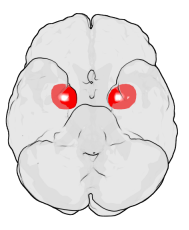
Photo from wikipedia
ABSTRACT Meditation training can improve mood and emotion regulation, yet the neural mechanisms of these affective changes have yet to be fully elucidated. We evaluated the impact of long‐ and… Click to show full abstract
ABSTRACT Meditation training can improve mood and emotion regulation, yet the neural mechanisms of these affective changes have yet to be fully elucidated. We evaluated the impact of long‐ and short‐term mindfulness meditation training on the amygdala response to emotional pictures in a healthy, non‐clinical population of adults using blood‐oxygen level dependent functional magnetic resonance imaging. Long‐term meditators (N=30, 16 female) had 9081h of lifetime practice on average, primarily in mindfulness meditation. Short‐term training consisted of an 8‐week Mindfulness‐ Based Stress Reduction course (N=32, 22 female), which was compared to an active control condition (N=35, 19 female) in a randomized controlled trial. Meditation training was associated with less amygdala reactivity to positive pictures relative to controls, but there were no group differences in response to negative pictures. Reductions in reactivity to negative stimuli may require more practice experience or concentrated practice, as hours of retreat practice in long‐term meditators was associated with lower amygdala reactivity to negative pictures – yet we did not see this relationship for practice time with MBSR. Short‐term training, compared to the control intervention, also led to increased functional connectivity between the amygdala and a region implicated in emotion regulation – ventromedial prefrontal cortex (VMPFC) – during affective pictures. Thus, meditation training may improve affective responding through reduced amygdala reactivity, and heightened amygdala–VMPFC connectivity during affective stimuli may reflect a potential mechanism by which MBSR exerts salutary effects on emotion regulation ability. HIGHLIGHTSMindfulness meditation related to lower amygdala activation to positive pictures.Amygdala‐prefrontal coupling increased after Mindfulness‐Based Stress Reduction.Amygdala activation to negative pictures was lower with more practice on retreat.
Journal Title: NeuroImage
Year Published: 2018
Link to full text (if available)
Share on Social Media: Sign Up to like & get
recommendations!